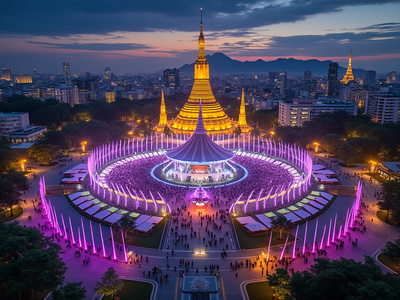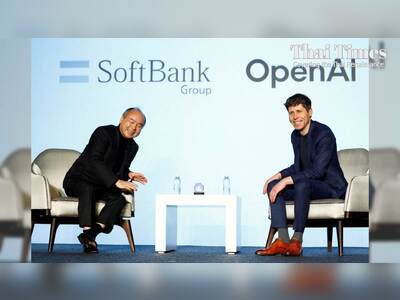
Chinese President Xi Jinping Engages Global Business Leaders to Attract Investment
In a bid to enhance investor confidence, Xi Jinping met with representatives from major multinational companies amidst rising tariffs and economic challenges.
Chinese President Xi Jinping convened a meeting with prominent global business leaders in Beijing, aimed at bolstering investor sentiment as the nation confronts economic challenges exacerbated by increasing tariffs and geopolitical uncertainties.
The meeting took place on the morning of March 28, 2025, at the Great Hall of the People, and included representatives from major international corporations such as FedEx, Standard Chartered, Sanofi, AstraZeneca, and ThyssenKrupp.
Key Chinese officials in attendance included Foreign Minister Wang Yi, Commerce Minister Wang Wentao, and Finance Minister Lan Fo’an.
During the meeting, Xi Jinping expressed appreciation for the contributions of foreign businesses to China's growth and job creation.
He stated that seven representatives shared their perspectives, which, according to him, the Chinese government would consider in future policy deliberations.
Xi emphasized the importance of maintaining open communication channels with international investors.
The context for the meeting includes a slowing Chinese economy, which has seen inbound investment decline to its lowest levels in over thirty years.
Economic analysts note that rising geopolitical tensions have diminished confidence among potential investors in the world's second-largest economy.
Next month, the United States is expected to conclude a review regarding China's compliance with the phase-one trade deal established during the Trump administration, potentially leading to the imposition of additional tariffs that could further impact investor sentiment.
Premier Li Qiang indicated that the Chinese government is preparing for unexpected economic shocks, as the country's growth target for the year is set at approximately 5%.
Economic forecasts suggest that significant stimulus measures amounting to trillions of yuan may be necessary to achieve this goal should tariffs increase dramatically.
The recent engagement with global corporate leaders underscores China's message of being open for business, in stark contrast to the protectionist policies associated with the previous U.S. administration.
Xi’s efforts to foster a positive environment for private enterprise have included high-profile meetings with influential entrepreneurs, such as Alibaba Group co-founder Jack Ma.
The meeting coincided with the ongoing China Development Forum and the Boao Forum for Asia, events designed to facilitate dialogue on economic development and cooperation.
This engagement represents a departure from past practices, where lower-ranking officials typically met with business executives on the sidelines of such forums.
Notably, Xi Jinping broke with tradition last year by engaging directly with American business people.
Furthermore, discussions around U.S.-China relations have also taken place with Republican Senator Steve Daines meeting various Chinese leaders, including Premier Li Qiang, in what analysts view as an initial move towards a potential summit between Xi and former President Trump.
In the context of deteriorating bilateral relations, several U.S. companies have faced scrutiny in China.
For instance, Walmart's executives were summoned by Chinese authorities in response to reports that the company had requested suppliers to absorb cost increases due to rising U.S. tariffs.
Additionally, U.S. firms such as PVH Corp., owner of Calvin Klein, and Illumina, a gene sequencing company, have been added to a blacklist by Chinese authorities as a consequence of the tariff measures.
The meeting took place on the morning of March 28, 2025, at the Great Hall of the People, and included representatives from major international corporations such as FedEx, Standard Chartered, Sanofi, AstraZeneca, and ThyssenKrupp.
Key Chinese officials in attendance included Foreign Minister Wang Yi, Commerce Minister Wang Wentao, and Finance Minister Lan Fo’an.
During the meeting, Xi Jinping expressed appreciation for the contributions of foreign businesses to China's growth and job creation.
He stated that seven representatives shared their perspectives, which, according to him, the Chinese government would consider in future policy deliberations.
Xi emphasized the importance of maintaining open communication channels with international investors.
The context for the meeting includes a slowing Chinese economy, which has seen inbound investment decline to its lowest levels in over thirty years.
Economic analysts note that rising geopolitical tensions have diminished confidence among potential investors in the world's second-largest economy.
Next month, the United States is expected to conclude a review regarding China's compliance with the phase-one trade deal established during the Trump administration, potentially leading to the imposition of additional tariffs that could further impact investor sentiment.
Premier Li Qiang indicated that the Chinese government is preparing for unexpected economic shocks, as the country's growth target for the year is set at approximately 5%.
Economic forecasts suggest that significant stimulus measures amounting to trillions of yuan may be necessary to achieve this goal should tariffs increase dramatically.
The recent engagement with global corporate leaders underscores China's message of being open for business, in stark contrast to the protectionist policies associated with the previous U.S. administration.
Xi’s efforts to foster a positive environment for private enterprise have included high-profile meetings with influential entrepreneurs, such as Alibaba Group co-founder Jack Ma.
The meeting coincided with the ongoing China Development Forum and the Boao Forum for Asia, events designed to facilitate dialogue on economic development and cooperation.
This engagement represents a departure from past practices, where lower-ranking officials typically met with business executives on the sidelines of such forums.
Notably, Xi Jinping broke with tradition last year by engaging directly with American business people.
Furthermore, discussions around U.S.-China relations have also taken place with Republican Senator Steve Daines meeting various Chinese leaders, including Premier Li Qiang, in what analysts view as an initial move towards a potential summit between Xi and former President Trump.
In the context of deteriorating bilateral relations, several U.S. companies have faced scrutiny in China.
For instance, Walmart's executives were summoned by Chinese authorities in response to reports that the company had requested suppliers to absorb cost increases due to rising U.S. tariffs.
Additionally, U.S. firms such as PVH Corp., owner of Calvin Klein, and Illumina, a gene sequencing company, have been added to a blacklist by Chinese authorities as a consequence of the tariff measures.











